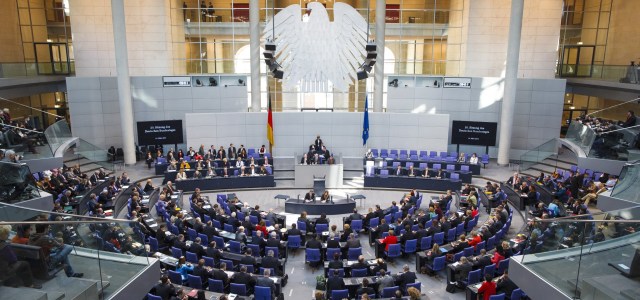The lower house of the German Parliament voted nearly 80% in favor of the proposed amendments to Germany’s Renewable Energy Act (EEG) on the last Friday in June. Craig Morris takes a look at the main changes and examines why some people are upset, and others aren’t.

On June 27th, the German lower chamber voted in favour of the proposed reforms of the renewable energy law. ( (c) Deutscher Bundestag / Thomas Trutschel / photothek.net)
Over at the German Energy Blog, legal expert Matthias Lang says his intern threw in the towel and quit his job when asked to review all of the changes. If you have a masochistic vein and can speak German legalese, the full 218-page PDF is here. Below, I sum up some of the highlights – or perhaps I should say “lowlights,” for not everyone is happy. But first, keep in mind that none of the changes are retroactive; as always in Germany, they only apply to new systems.
The amendments pursue two main goals: first, keep the cost of the energy transition down; and second, make sure that the EEG is in line with EU law.
Towards the second goal, the new amendments set the stage for a transition away from feed-in tariffs to a bidding system, which could be implemented by 2016/2017.
Biogas systems will have an annual ceiling for new installations of 100 MW, which is quite low. Instead of simply receiving a feed-in tariff for each kilowatt-hour generated, they will now be incentivized to follow demand – a sensible requirement since biomass, unlike wind and solar, is actually dispatchable. The biomass sector is therefore happy to play this role, which makes it special among renewable sources of power, but unhappy about the restrictions on growth that will prevent it from playing this role to a large extent.
The changes to photovoltaics mainly concern the application of part of the renewables surcharge to power consumed directly, i.e. never sold to the grid. Admittedly, all renewable power generators larger than 10 kilowatts, not just PV, are now subject to a fraction of the surcharge, which will start at around 0.02 euros and rise to around 0.025 euros by 2017. The additional roughly 2 cents per kilowatt-hour will, however, stymie emerging PV market niches such as direct sales of solar power from landlords to tenants. One example of a wind project that this policy will impact is the Port of Hamburg.
For wind power, the target for newly installed capacity is 2.5 gigawatts per year as expected, but the biggest change for wind is a different one – Berlin gave the country’s 16 states the right to set their own minimum distance requirements between wind farms and developed areas. The result is expected to be a slew of lawsuits and considerable chaos. Bavarian Christian Social politician Josef Göppel, one of 13 CDU/CSU politicians to vote against the amendments, states on his website that differing state laws “will not stand in court” and that the most restrictive ones in Bavaria and Saxony will prevent the German government from reaching its targets.
Only one SPD member voted against the amendments, which are expected to become law on August 1. The amendments cannot be prevented from becoming law. The Bundesrat, essentially the upper chamber of Parliament, can only postpone the inevitable by requesting changes, which the Bundestag does not even have to make – it already has the two thirds majority required to override anything the Bundesrat might say on the matter.
Industry Minister Sigmar Gabriel says the rushed effort is necessary because Brussels is breathing down his neck, primarily concerning industry exemptions to the renewable surcharge. With wholesale power prices down by around 20 percent over the past few years, however, Germany’s largest industrial firms are doing so well that industry in neighboring countries has begun to complain about unfair competition. These complaints have not stopped Gabriel from charging that the changes he proposes are needed to prevent the Energiewende from deindustrializing Germany. In reality, the government cannot list a single example of a German firm leaving the country because of high power prices, nor has any press report.
Naturally, opposition politicians are up in arms about the changes, and they agree with the coalition politicians who voted against the amendments on one main issue: the new rules might slow down citizens and cooperatives, who have been the main driving force behind Germany’s energy transition up to now.
But not everyone is so gloomy. Some experts – probably the ones who want to open such businesses – say that distributed renewables could sell to aggregators, who act as mediators between power markets and disparate small units operating as a virtual power plant. It’s unclear how exactly that would work, but one thing is certain – we are now going to find out.
The problem is that, if the legal experts like Matthias Lang say they are overwhelmed by the changes, it is likely that the amendments are more rushed than properly thought-through.
Craig Morris (@PPchef) is the lead author of German Energy Transition. He directs Petite Planète and writes every workday for Renewables International.